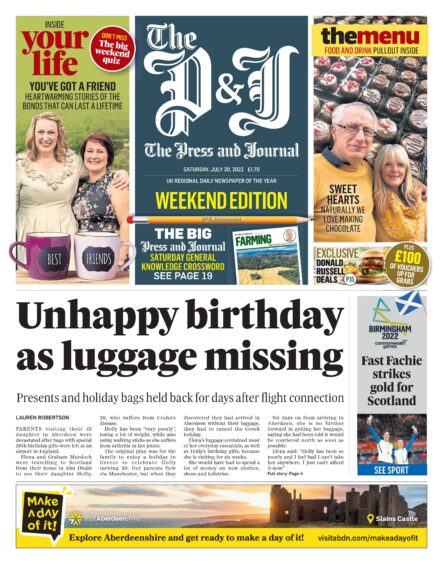Does The P&J aspire to be a quality regional newspaper, or the “village squeak”?
This was the unexpected question one reader recently suggested we should urgently be asking ourselves.
It was prompted by our choice of front-page story that day, one not nearly serious enough for their liking.
How on earth, when our country and indeed the wider world is beset by so many awful crises, had we decided the most important thing to tell readers about that day was that “someone had lost their luggage” they asked?

At a time when people are starving and dying, how could we focus on someone’s spoiled holiday?
Put in those terms, the questioning of our journalistic ambition might sound perfectly reasonable.
Perhaps even now you are thinking “aye, that reader has a point here”.
As so often though, things are by no means so simple.
Why does someone losing their luggagge matter?
In fact I would argue there are very good reasons why picking that story for the “splash” is in fact a good indicator that we ARE a quality regional newspaper – just as we have been for 275 years and intend to be for many more to come.
Some of the reasons revolve around the detail of the saga itself that we were reporting on.
The reader who questioned our decision was keen to point out that he too – along with many others – had experienced the agony of realising your suitcase is just not going to turn up on the carousel.
I’ll wager thought that none of those bags contained 30th birthday presents for a young woman suffering a number of serious medical conditions from her mother who has a brain tumour. Nor that their non-appearance kyboshed a much-needed holiday for them both.
These are the kind of elements that elevate an otherwise ordinary tale into a moving one, one that we know many people will want to read, one that will affect them emotionally in a variety of ways.
That alone made this story worthy of reporting.
But then we must also add in the wider context.
Quality newspapers help expose failings to benefit public
As the article pointed out, this family were by no means alone in experiencing a terrible time travelling by air this summer.
Their experience may have been a particular one but it spoke also to an issue affecting a huge number of readers, readers whose stories we have continued to feature in the weeks since.
Putting this issue in the full glare of public attention – and keeping it there – is part of how, as journalists, we make a practical difference.
Major organisations, whether airlines or governments, are far more likely to change their behaviour, to work harder to improve the way they operate, when they know their failings are prone to be exposed in that way.
And that helps our readers, directly – fulfilling one of the fundamental missions we embark on each day.
Variety is the spice of life
Take all that into account and there’s already a strong argument for the prominence the story received, not least in a paper that – as with every edition – covered the whole spectrum of news from near and far.
Likewise the top billing it got at the time was on the homepage of our website, which is no less studiously curated than the print pages.
But there’s still another important idea that must be factored in: that variety is the spice of life.
We have long understood that we deliver readers a uniform diet of stories at our peril.
Only by carefully mixing the serious and the fun, the informative and the entertaining, the happy and the sad, have we ever been able to keep people reading and thereby sustain the important public service we provide.
Sobering recent research from the Reuters Institute for the Study of Journalism suggests that finding this balance is more important right now than ever before.
Keeping news impactful
The proportion of people who say they steer clear of the news at least some if not all of the time has more than doubled in the UK in just five years – and is now worryingly close to being half the population.
Many say keeping abreast of the latest developments brings them down.
The younger ones among them also say they find it hard to follow and would like it made more accessible.
This “news avoidance” phenomenon is clearly one which gives us much food for thought as we contemplate how we adapt our products to keep them relevant to the tastes of modern audiences.
Certainly, it makes clear that a relentless in-your-face focus on the biggest challenges confronting society would most likely result in fewer people reading the news we produce – reducing the impact of all our journalism.
So to answer the question: yes, of course, we aspire to maintain centuries of proud history as a quality regional news provider.
But to do that, we can’t have the same things on the front page all the time.
Do you have a question about the way we work? Please send it to readersombudsman@pressandjournal.co.uk




Conversation